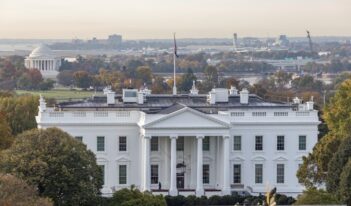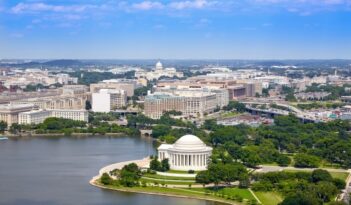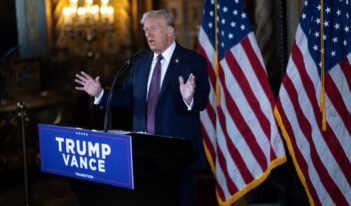
President Donald J. Trump signed executive orders ending birthright citizenship, halting the hiring of federal civil employees, and more…
IN THE NEWS
- A federal judge temporarily blocked President Donald J. Trump’s executive order ending birthright citizenship—an immigration policy granting citizenship to babies born in the United States regardless of the citizenship status of their parents. The executive order would withhold birthright citizenship from U.S.-born babies with mothers illegally or temporarily in the United States and non-citizen or permanent resident fathers. Critics of the executive order contend that it violates the 14th Amendment to the U.S. Constitution, which states that those born in and subject to the jurisdiction of the United States are U.S. citizens. Some advocates of immigration restrictions argue, however, that the 14th Amendment was never intended to extend citizenship to everyone born in the United States.
- President Trump signed an executive order halting the hiring of any federal civil employees in the executive branch. The only exceptions to this order are positions in the military, public and national security, immigration enforcement, and positions that merit an exemption from the Director of the Office of Personnel Management. The order states that it is following on President Trump’s promise to “restore merit to government service” and his goal to “reduce the size of the federal government’s workforce through efficiency improvements and attrition.”
- President Trump signed an executive order to dismantle diversity, equity, and inclusion (DEI) programs within the federal government, criticizing the programs for “immense public waste and shameful discrimination.” The order mandates the closure of all DEI-related offices and positions in the federal government within 60 days. The U.S. Office of Personnel Management issued a memo to the heads of government agencies instructing them to place affected federal employees on administrative leave by 5:00 p.m. on Wednesday, January 22. Although the order is not a ban, it directed the Attorney General to encourage the private sector to end DEI programs. The order does not prevent teachers at colleges and universities “from engaging in First Amendment-protected speech” or advocating practices prohibited by the order.
- President Trump signed an executive order declaring that the U.S. government will only recognize two sexes, male and female. The executive order defines female as a person belonging to the sex that produces the large reproductive cell and defines male as a person belonging to the sex that produces the small reproductive cell. The executive order mandates that the federal government use the term “sex” as opposed to “gender,” and requires that identification documents including passports and visas reflect the holder’s “accurate sex.” The executive order states an intention to protect women’s rights by using clear and accurate language that recognizes the biological reality of sex.
- In one of his first actions in office, President Donald J. Trump signed an executive order to withdraw the United States from the Paris Climate Agreement. The agreement, which was adopted by 196 countries in 2015, aimed to prevent global temperatures from rising and limit the effects of climate change. In the executive order, President Trump touted the United States’ prior environmental efforts and stated that the Paris Climate Agreement and other treaties “steer American taxpayer dollars to countries that do not require, or merit, financial assistance in the interests of the American people.”
- President Trump signed an executive order withdrawing the United States from the World Health Organization (WHO), citing the organization’s alleged mishandling of the COVID-19 pandemic and undue political influence from member states. The order will halt U.S. financial contributions and initiate a 12-month withdrawal process. The United States is currently the WHO’s top donor country, contributing approximately 18 percent of the WHO’s total funding. The next-largest donor is the Bill and Melinda Gates Foundation, and the next-largest state donor is Germany, which accounts for approximately 3 percent of funding. Global health experts warn that this decision could jeopardize critical health programs, including those addressing HIV/AIDS and tuberculosis.
- President Trump issued an executive order instructing federal agencies to halt spending tied to President Joseph R. Biden’s climate initiatives, including provisions in the Inflation Reduction Act of 2022 (IRA). President Trump targeted funding for renewable energy projects and tax credits for electric vehicles, citing concerns over fiscal responsibility and energy independence. The order aims to expand domestic energy resources “with particular attention to oil, natural gas, coal, hydropower, biofuels, critical mineral, and nuclear energy,” highlighting a shift in energy policy toward fossil fuels. The Biden Administration, however, already committed 84 percent of the IRA grants, protecting all but $11 billion from clawback by the Trump Administration.
- The U.S. Court of Appeals for the Fifth Circuit affirmed a lower court ruling that found the Deferred Action for Childhood Arrivals (DACA) program unlawful. DACA, which was launched by the Obama Administration and reinvigorated by the Biden Administration, allowed children who illegally entered the United States to remain in the country. The court’s holding was narrow, only binding those in Texas and giving current DACA beneficiaries temporary protection as the case continues. Although the Biden Administration likely would have appealed the case, there is uncertainty whether the Trump Administration will do so.
WHAT WE’RE READING THIS WEEK
- In an article published in the Cornell Law Review, Gregory Day, an associate professor at the University of Georgia, argued that state and federal actors enact protectionist regulations aimed at preventing immigrants from competing against “native” businesses and workers. Day noted how historical attempts to exclude immigrants came from labor unions, which did not want immigrants lowering wages or seizing jobs. Day argued that the federal government aided unions in passing laws restricting competition from immigrants, such as the Davis-Bacon Act of 1931, which required federal employers to pay the “local prevailing wage” to employees. The purpose of the Act, Day contended, was to raise salaries enough that employers would choose not to hire immigrants.
- In an article published in the Arizona State Law Journal, Yonathan Arbel, the William Alfred Rose Professor of Law at the University of Alabama School of Law, Matthew Tokson, a professor of law at the University of Utah S.J. Quinney College of Law, and Albert Lin, the Martin Luther King Jr. Professor of Law at U.C. Davis School of Law, argued that artificial intelligence systems must be regulated systemically, instead of only regulating these systems’ applications. The trio described present and potential harms of artificial intelligence, including discrimination and invasions of privacy, and contended that current regulations are insufficient. To combat these harms, Arbel, Tokson, and Lin advocated comprehensive “oversight of AI system development and deployment,” through both domestic and international regulations.
- In a recent article published in the American University Law Review, Erin Braatz, a law professor at Suffolk University Law School, argued that administrative law fails to address prison administration adequately, leaving significant gaps in oversight and accountability. Braatz contended that typical mechanisms of administrative law, such as judicial deference to agency expertise and notice-and-comment rulemaking under the Administrative Procedure Act, “fail to limit the arbitrary exercise of government power” in the prison context. Braatz also criticized the lack of judicial review of disciplinary decisions in prisons. She advocated integrating prisons into administrative law frameworks to reduce arbitrary government action, improve oversight, and enhance legitimacy. Addressing these gaps, Braatz argued, may help improve prison conditions.
EDITOR’S CHOICE
- In an essay in The Regulatory Review, Cary Coglianese, the Edward B. Shils Professor of Law at the University of Pennsylvania and the Director of the Penn Program on Regulation, explained that, for regulations to work, they must influence corporate behavior to align with the overall well-being of society. Coglianese presented a three-step model of effective regulation, according to which the government adopts and enforces regulation which then induces changed behavior in the targets of regulation and ultimately leads to an improvement of conditions in the world. Coglianese explains that the improved conditions that can result from effective regulation entail a reduction of regulatory problems such as workplace accidents, bank failures, and fraudulent transactions. Coglianese concludes by noting that compliance is critical to improving regulatory outcomes and solving problems affecting society.



